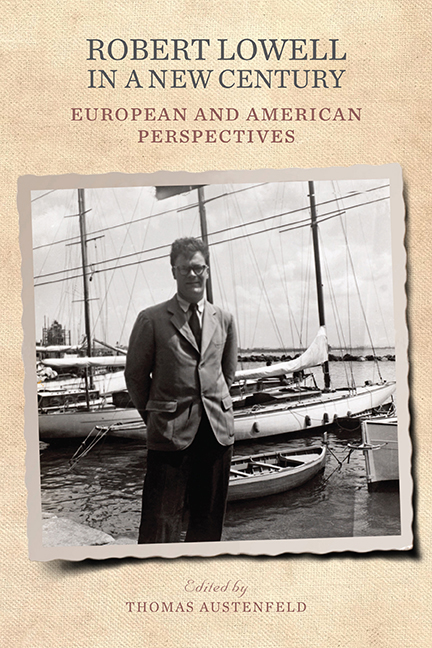Book contents
- Frontmatter
- Dedication
- Contents
- Acknowledgments
- Introduction
- 1 Revisiting Robert Lowell's Mental Hospital Poems
- 2 Sensual Drift and Ethnic Longing in Robert Lowell
- 3 Reworking the Same Water: Robert Lowell Transported
- 4 “Sweet salt embalms me”: A Hippocratic Approach to the Role of the Sea in the Poetry of Robert Lowell
- 5 More Delicate Than the Historian's Are the Map-Maker's Colors: Correspondences between Lowell's Poetics of History and Bishop's Poetics of Space
- 6 Robert Lowell and Ezra Pound's Economics
- 7 Robert Lowell and Ezra Pound in Washington and Rapallo
- 8 “Why Holland?”: Robert Lowell in Amsterdam
- 9 Lowell and Ungaretti: Imitations and Beyond
- 10 Robert Lowell's Credo
- 11 “Marriage? That's another story”: Reconsidering the Marital Trope in Robert Lowell's Poetry
- 12 “Oh No”/“Yes Yes”: Lowell and the Making of Mistakes
- 13 Robert Lowell: The Power of Influence
- Notes on Contributors
- Index
5 - More Delicate Than the Historian's Are the Map-Maker's Colors: Correspondences between Lowell's Poetics of History and Bishop's Poetics of Space
Published online by Cambridge University Press: 26 June 2019
- Frontmatter
- Dedication
- Contents
- Acknowledgments
- Introduction
- 1 Revisiting Robert Lowell's Mental Hospital Poems
- 2 Sensual Drift and Ethnic Longing in Robert Lowell
- 3 Reworking the Same Water: Robert Lowell Transported
- 4 “Sweet salt embalms me”: A Hippocratic Approach to the Role of the Sea in the Poetry of Robert Lowell
- 5 More Delicate Than the Historian's Are the Map-Maker's Colors: Correspondences between Lowell's Poetics of History and Bishop's Poetics of Space
- 6 Robert Lowell and Ezra Pound's Economics
- 7 Robert Lowell and Ezra Pound in Washington and Rapallo
- 8 “Why Holland?”: Robert Lowell in Amsterdam
- 9 Lowell and Ungaretti: Imitations and Beyond
- 10 Robert Lowell's Credo
- 11 “Marriage? That's another story”: Reconsidering the Marital Trope in Robert Lowell's Poetry
- 12 “Oh No”/“Yes Yes”: Lowell and the Making of Mistakes
- 13 Robert Lowell: The Power of Influence
- Notes on Contributors
- Index
Summary
“CAL” AND “ELIZABETH” are what Robert Lowell and Elizabeth Bishop called each other in their lifelong correspondence, which “offers a window on the breakdowns and depressions that characterized both poets’ lives, and the sense of personal tragedy they shared over the course of their thirty-year friendship.” In an early letter of a correspondence that would fill the eight hundred pages of their complete letters, Lowell responds to what can be described as poetic courting by Bishop. In a flirtatious tone that reciprocates that of Bishop's initial letter, Lowell establishes that his pen pal “must be called [Elizabeth],” and that he is “called Cal.” He adds that he “won't explain why” and that none of the prototypes are flattering: “Calvin, Caligula, Caliban, Calvin Coolidge.” The facetious and alliterative list ends with a quip: Lowell adds, “Calligraphy—with merciless irony,” thus evoking Elizabeth Bishop's handwriting that he found difficult to decipher. These early letters show, as Thomas Travisano has proposed, that the two poets were attracted to each other by their “shared experience of outsiderhood,” and it can be argued that they couched this attraction to each other “by resignifying terms of normalcy” that combined romantic attraction and professional interests. However, the ostensibly platonic literary exchange of “words in air” of this “queer couple” was also a place of correspondence and divergence between two poetics that responded to the poetic crisis of sense after modernism. In what follows, I propose to examine the correspondences between what I shall be referring to as Lowell's poetics of history and Bishop's poetics of space. I do not intend to place them in stark contrast, let alone adjudicate on the poetic superiority of one over the over, but rather to indicate that these two poetics encapsulate the possibilities of post-modernist responses to the crisis of modernism. By rewriting the last line of Bishop's poem “The Map,” I wish to suggest that these two poetics can be likened to what Bishop calls in that poem the work of the geographer and the historian. History and geography are two ways of investigating an individual's position in time and space and they need one another in order to develop, though their correspondences can only happen “in air.”
- Type
- Chapter
- Information
- Robert Lowell in a New CenturyEuropean and American Perspectives, pp. 67 - 80Publisher: Boydell & BrewerPrint publication year: 2019



